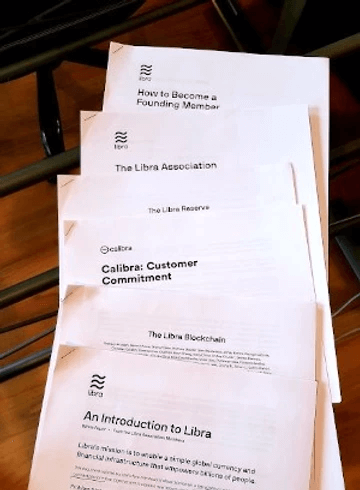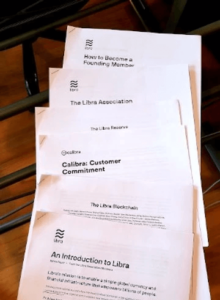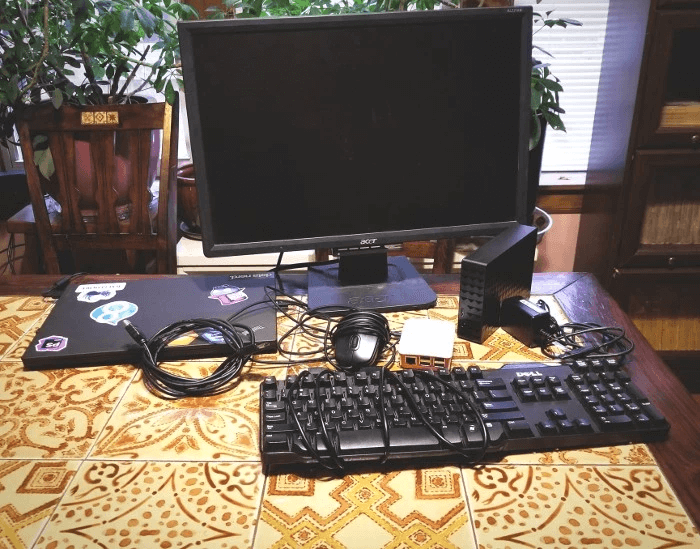
There a quite a few reasons to dislike Facebook. Thankfully I think most of us are pretty familiar with them these days. So why then would I spend two days of my life researching a project from a company with so many issues? Because love or hate Facebook, the Libra project is a huge milestone in the evolution of money.
In a sense, this is already a huge victory for the crypto world. Visa and MasterCard just joined a “cryptocurrency” project. …Bitcoin has succeeded in changing the world.
 Is it a good change? Will this bring financial inclusion and opportunity or dystopian surveillance and control? I’m not sure yet. But I’m optimistic for the projects education and crypto on-boarding potential.
Is it a good change? Will this bring financial inclusion and opportunity or dystopian surveillance and control? I’m not sure yet. But I’m optimistic for the projects education and crypto on-boarding potential.
I read 6 different Libra documents, browsed lots of commentary, watched a handful of videos and discussed it with half a dozen crypto friends. Here are my notes…
Big Picture Implications
Let’s take a moment to appreciate the big picture political and monetary implications of this project.
Facebook is creating a “new global currency” and should it succeeds it wrestles a lot of power away from governments and central banks. Bitcoin changed the world.
Now the Libra Reserve document makes it clear that the Libra Association “does not set monetary policy.” It “mints and burns coins only in response to demand”. Libra can’t directly control any nation’s monetary policy, but it changes the game. Commentary from Andreas M. Antonopoulos:
“Think about what happens in, say India, when they decide to apply monetary policy (devalue) and people have access to a “hard” Libra alternative. It undermines their power of monetary policy”
Also, just take a step back and see all these established, mainstream businesses trying to adapt themselves to the new crypto world. It’s a real “wow, we’re here, it’s happening” kind of moment.
The White Paper — Link
What struck me first about the white paper is that it got all the terminology right. It says all the right things. It’s hijacked the crypto communities narrative. It discusses open, decentralized systems, “empowering billions of people”, the unbanked, it even mentions “the internet of money”.
The cliff notes:
– It starts by calling the project a “decentralized blockchain”, of which it is neither. (It’s decentralized only in comparison to traditional payment processors. Compared to Bitcoin, it’s hard to make the argument that it’s decentralized. The data structure is a giant Merkle Tree, not a blockchain.)
– It’s a “smart contract platform”.
– It acknowledges that the current financial system is in need of an upgrade.
– In many places it notes the lack of financial service or very high fees for services dealt with by people “all over the world”.
– It notes “volatility and lack of scalability” has hindrances to the goals of an inclusive global currency.
– Libra is designed to be a medium of exchange.
– An interesting remark that I wish we had more details on “An additional goal of the association is to develop and promote an open identity standard.”
– They intend to Innovate on “compliance and regulatory fronts to improve the effectiveness of anti-money laundering.”
– It sounded like a libertarian bitcoiner wrote it in places…
“We believe that people have an inherent right to control the fruit of their legal labor.”
“We believe that global, open, instant, and low-cost movement of money will create immense economic opportunity and more commerce across the world.”
“We believe that people will increasingly trust decentralized forms of governance.”
– Libra is “backed” by fiat to give it “intrinsic value”, which as Caitlin Long pointed out is a misunderstanding of money.
– The “blockchain” protocol will be open source.
– The Libra Association is an independent non-profit headquartered in Geneva, Switzerland.
– Association members will be the first “validator nodes” on the network.
– Those 28 founding members are…
Mastercard, PayPal, PayU, Stripe, Visa, Booking Holdings, eBay, Facebook/Calibra, Farfetch, Lyft, Mercado Pago, Spotify AB, Uber, Illiad, Vodafone, Anchorage, Bison Trails, Coinbase, Xapo Holdings, Andreessen Horowits, Breakthrough Initiatives, Ribbit Capital, Thrive Capital, Union Square Ventures, Creative Destruction Lab, Kiva, Mercy Corps, Women’s World Banking
– They hope to have 100 founding members by the 2020 launch.
– Facebook has a leadership role though 2019. Then it will not be directly involved in the Association. Instead it’s “regulated subsidiary” Calibra will be Facebook’s connection to the project.
– This is done to “ensure separation between social and financial data”.
– “Facebook’s role in governance of the association will be equal to that of its peers.”
– The network will begin as a permissioned “blockchain” with the “ambition” to become permissionless.
– The association will begin researching this transition within 5 years.
– It’s a scalable, global currency, using the new Move programming language and utilizing a Byzantine Fault Tolerant consensus approach called LibraBFT.
– It does not use proof-of-work due to its inefficient energy use.
– “the Libra Blockchain is a single data structure that records the history of transactions and states over time.” i.e., it’s not, technically speaking, a blockchain.
– The network is pseudonymous allowing addresses that are not linked to real-world identity. (at least not on the protocol level)
– There is a testnet available.
– Libra is designed to be stable and “low inflation”, to achieve this it is backed by bank deposits and short-term government securities in currencies from stable and reputable central banks.”
– Libra is not pegged to any one currency. “The value of one Libra in any local currency may fluctuate.”
– “The assets in the Libra Reserve will be held by a geographically distributed network of custodians”
– Interest from the fiat “backing” held by the association “will be used to cover the costs of the system, ensure low transaction fees, pay dividends to investors who provided capital to jumpstart the ecosystem”
– “Users of Libra do not receive a return from the reserve.”
– “The association is the only party able to create (mint) and destroy (burn) Libra. Coins are only minted when authorized resellers have purchased those coins from the association with fiat assets to fully back the new coins. Coins are only burned when the authorized resellers sell Libra coin to the association in exchange for the underlying assets.”
The Technical Paper — Link
I rather enjoyed reading the technical paper. As far as permissioned, not exactly a blockchain, not very decentralized protocols go, it seems pretty decent!
I got the impression that a lot of good, honest, research and work went into the design. Below are the cliff notes:
– Looks like it will be a smart contract platform.
– The protocol includes what they are calling “modules”, basically, smart contracts. While it seems their functionality will be very limited at launch, they plan to open it up to smart contract developers.
– There is a stack based VM.
– Transactions require gas in a fashion very similar to Ethereum’s implementation.
– The protocol is being written in Rust.
– These “modules” control “resources”. It looks like the only resource initially available will be the Libra coin.
– Modules can be programmed using and new language called “Move”.
– It looks like a lot of thought went into the design of Move, particularly in making it safer and more secure than existing smart contract languages.
– Move includes many features designed to make it difficult for developers to introduce exploitable errors into their code.Technically speaking, this isn’t a blockchain. There are no linked blocks of data.
– The data structure is more like a giant Merkle Tree.
– This is just fine in this situation as it’s a permissioned network which requires much less security and so simpler data models like this can be used.
– There is no KYC built into the protocol. It seems that will be done in the Calibra wallet discussed below.
– The protocol does not use UTXO’s. It is account based.
– These accounts are pseudonymous.
– The network is Byzantine fault tolerant. Meaning that the network will continue to reach consensus as long as ~2/3rds of the “validators” are behaving honestly.
– In this closed system, that is not likely to be a problem.
– The consensus protocol is named “LibraBFT”.
– While it will be a permissioned system at launch, it may not remain that way.
– The plan is to transition to proof-of-stake if/when the network is made public.
– The estimated Transaction Per Second is 1000.
– State channels will be available, and a second layer is planned for.
– “Block time” isn’t quite the right wording here, settlement time, or “finality time” as they call it will be 10 seconds.
The Association — Link
This document provides information on the structure and functioning of the Libra Association.
Cliff notes:
– The Association is an “independent, Swiss not-for-profit organization”.
– There is a Libra Investment Token “that grants rights to a share of the future interest accumulated in the Libra Reserve”
– “Operating and policy decisions of the council require various voting thresholds depending on the importance of the decision.”
– “While final decision-making authority rests with the association, Facebook is expected to maintain a leadership role through 2019.”
– “Facebook created Calibra, a regulated subsidiary, to ensure appropriate separation between social and financial data and to build and operate services on its behalf on top of the Libra network.”
– “Once the Libra network launches, Facebook, and its affiliates, will have the same commitments, privileges, and financial obligations as any other Founding Member.”
– “As one member among many, Facebook’s role in governance of the association will be equal to that of its peers.”
– Association members are all validator nodes who have a representative who sits on the council. The council elects a board.The stated goals…
– “The transition to permissionless governance and consensus node operation, lowering the barriers to entry for participation and reducing the reliance on Founding Members.”
– “Minimizing the association’s role as manager of the Libra Reserve by fully automating reserve management.”
– “Over time, the objective is for the association’s primary role to be the coordination of the open-source community to define and develop the technical roadmap of the Libra network.”
– “Validator nodes, represented in the council, have the ultimate power.”
– Most votes are simple majority, the more important votes are greater than 2/3rds supermajority.“
– The voting powers in the council are proportional to stake (initially in the Libra Investment Token and, in the future, in Libra), which is a reflection of the level of commitment of the member (validator node) toward the network. However, voting rights are capped for any one Founding Member to avoid concentration of power.”
– The Libra Reserve is managed by the association with the goal of value preservation.
– An investment of at least $10 million, via the purchasing of the Libra investment Token is required to be a node on the network.
– Each $10 million investment entitles one vote in the council, subject to a cap.“
– By the fifth anniversary of the network, at least 20 percent of the voting power in the council will be allocated to node operators based on the quantity of Libra held by them, not just the quantity of investment tokens.”
– “The Libra protocol is expected to have a limitation on the number of active validator nodes (and thus on the number of council members) for at least several years.”
– The board consists of no less than five and no more than 19 members.
– There is a Social Impact Advisory Board.
Commerce and the Unbanked
All the marketing around this focuses on commerce, financial inclusion and banking the unbanked. There are some that are very optimistic about it’s potential there. Faecbook reports over 2 billion, yes billion, active monthly users. That’s an incredible reach. And a lot of those people live in financially underserved areas. I have to imagine that there is some truth to this financial inclusion message. How many people in the world have WhatsApp but not good financial services? That’s about to change.
My biggest concern about this project is the potential for massive, global, financial surveillance. More on that below.
Assuming millions of financially underserved people use this product, they will be data mined, but there may be some very big benefits for them besides the access to a new global currency.
Imagine all these millions of people being educated about crypto… and becoming comfortable using it. If Libra is integrated into existing crypto exchange systems, this project has the potential to serve as a HUGE onrampinto real crypto (Bitcoin, etc.)
The Calibra Wallet — Link
I only found one document on the Calibra wallet. If I missed something please send it my way!
It seems that this is where all the KYC/AML will happen.
What remains a big question for me is if Calibra will be the only allowed wallet. And if so for how long? If the platform does become public that would open the door for many other wallets.
This particular document is all about data privacy. It starts by saying, “Calibra is being designed with a strong commitment to protecting customer privacy. We believe that customers hold rights to their data and should have simple, understandable, and accessible data-management controls.” However, the list of exceptions that follows that did not inspire confidence.
– Calibra is a custodial wallet.
– This wallet will be available initially via WhatsApp, Faecbook Messenger and on iOS and Android.
– Calibra requires ID verification both “documentary and non-documentary”.
– “Calibra customers’ account information and financial data will not be used to improve ad targeting on the Facebook, inc. family of products.”
– “The limited cases where this data may be shared reflect our need to keep people safe, comply with the law, and provide basic functionality to the people who use Calibra. For example:” (emphasis mine)
– “Preventing fraud and criminal activity”
– “Compliance with the law”“Payment processing and service providers … we share only the Calibra customer data that is necessary for completing the defined activity or service.”
– “Calibra may share aggregated data to Facebook, Inc. or third parties relating to the performance of its products and services.”
– “if a Calibra product feature can be personalized or improved with data from Facebook, we will first obtain customers’ consent to share the relevant data with Calibra”
– “Calibra will use aggregated Facebook, Inc. data that is not linked to your Calibra account to improve the Calibra product.”
– “Calibra will use customer data to facilitate and improve the Calibra product experience, market Calibra products and services, comply with legal and regulatory obligations, and ensure safety, security, and integrity.”
– “Calibra will conduct a risk assessment on the basis of guidelines issued by the Financial Action Task Force (FATF), the global standard-setting body for Anti-Money Laundering and Countering the Financing of Terrorism (AML/CFT), as well as applicable regulators. The risk assessment will identify the threats and vulnerabilities of Calibra and craft a thoughtful and robust response including oversight structures, controls implementations, monitoring, and audits.”
– “Calibra will implement a robust Anti-Money Laundering and Countering the Financing of Terrorism (AML/CFT) program on its platform wherever the product is available, irrespective of whether local regulations have applied AML laws to cryptocurrency wallets.”
– Calibra will not be available in jurisdictions that have banned cryptocurrencies.
– The document has a section on consumer protection.
– The relationship between Calibra and Libra is explained.
Financial Surveillance
Financial surveillance remains my biggest concern. Facebook owned Calibra will hold the database that connects the network addresses with the real-world identities of all the users.
This inspires Orwellian, dystopian images in my head. It is the most frightening aspect of this entire project. Facebook’s business model is based off data, I have to imagine that that’s what they plan to get out of this venture as well.
Open Systems
Facebook is in between a rock and a hard place here. They have a bad reputation with privacy issues and yet will have to answer to regulators on money laundering concerns. …While they do have a huge audience, they just aren’t the right vehicle for a payment system like this. No business is. This situation clarifies the case for open, permissionless, truly decentralized systems.
All in all, I’m optimistic about this project. I am bolstered by the amazing impact that open blockchains have had on the world and more enthusiastic about them than ever!
—
Thank you to the Blockchain Institute who sponsored my time researching this piece.
The Blockchain Institute is a non-profit organization that researches, contributes to and teaches blockchain technology.
If this piece was helpful to you, checkout out our other resources at theblockchaininstitute.org
Courses: https://theblockchaininstitute.org/courses/
Resource page: https://theblockchaininstitute.org/resources/



0 Comments